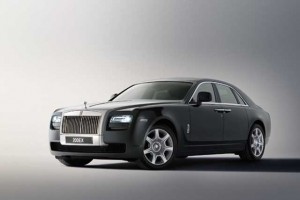
Rolls-Royce aims to take on Bentley's Continental Flying Spur with the new Ghost.
What does it mean when you lose a third of your wealth in a deep economic downturn?
For the average consumer, it could leave you struggling for survival, and certainly not in the position, never mind the mood, for buying a new car. Even the world’s most elite have been hurt by the latest recession, however. If you’ve seen your net worth drop from, say, $3 billion to 2, you’re not likely worrying about the rent money. Even so, the affluent have reined in spending, as well, says Tom Purves, the long-time head of BMW’s North American operations, and now the CEO of Rolls-Royce Motor Care.
“Rolls’ customers are insulated but not immune,” Purves said, during a conversation with TheDetroitBureau.com about the sharp slide in global luxury car sales.
How long the downturn in high-line products will continue is a matter of debate. At a conference, over the weekend, a panel, including BMW’s global design director, Adrian van Hooydonk, debated whether “modest is the new luxury.” Purves said he’s anything but convinced.
“Every time we have a recession, we hear this conversation. Two years later, ladies are back to buying mink coats,” he explained, “and somebody makes an even more expensive car.”
In Rolls’ case, the company hopes to emerge from this unusually severe recession making a less expensive automobile than its $400,000 Phantom. At the Geneva Motor Show, in March, the British marque finally revealed the production version of what it had dubbed, at various times, the 200EX and RR4. And last month, it gave the downsized sedan a formal name, Ghost, borrowing from its storied heritage the moniker applied to the company’s very first successful model, a century ago.
When it hits market, in the 2010 model-year, the Ghost will go up against Bentley’s popular Continental line-up, notably the Flying Spur sedan. Where Bentley’s emphasis is on performance, however, Rolls will emphasize “refinement,” contended Purves. And that, he believes, will help it command a steeper price tag than Bentley, its former carmaking partner.
Finally figures won’t be released until close to production, but Purves suggested to TheDetroitBureau.com that something close to $300,000 would be a “likely” target.
Ghost, meanwhile, will eventually account for “60 to 70 percent” of Rolls’ global sales, or about 3,000 cars a year – at least if the British subsidiary of BMW AG is on the mark. The company fell significantly short of its sales goals, early this decade, after splitting off from Bentley – which was sold to BMW’s German rival, Volkswagen AG. But the big Phantom slowly gained traction until the global auto slump hit.
Like Bentley, with the Continental line, Rolls appears likely to offer more than just a sedan version of Ghost, Purves confirmed. Precisely what’s in mind, the CEO wouldn’t reveal, though he acknowledged that speculation about a coupe and a convertible was “perfectly reasonable. A wagon doesn’t make sense and an SUV, absolutely not.” When asked if there could be still other variants, Purves vaguely suggested, “Yes, but I’m not going to talk about it.”
Like other high-line luxury manufacturers, Rolls is well aware of the shift towards “green” technology, both in terms of regulatory demands and consumer desires. “We cannot be anything other than involved” in this movement, said Purves. “If we act irresponsibly, we’re in trouble.”
Having BMW as a parent is a definite plus, he asserted, giving Rolls access to a variety of advanced powertrains. Surprisingly, the automaker has no plans to offer a diesel in its line-up, even though oil-burners now account for the majority of luxury sales in Europe. The problem, Purves said, is that his brand’s primary markets are the U.S., China and Japan, where there is little interest in diesel power.
On the other hand, Rolls is watching closely to see where the market for electric powertrains is heading, and Purves hinted that a hybrid Rolls, even a purely electric model, would not be out of the question, in the years to come.
